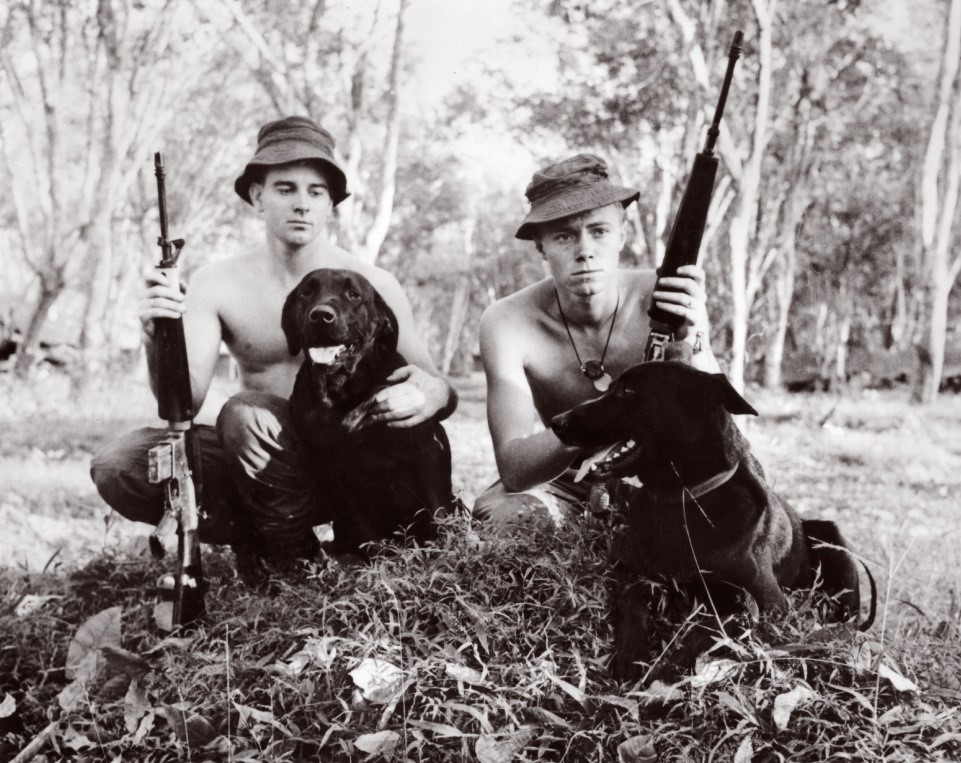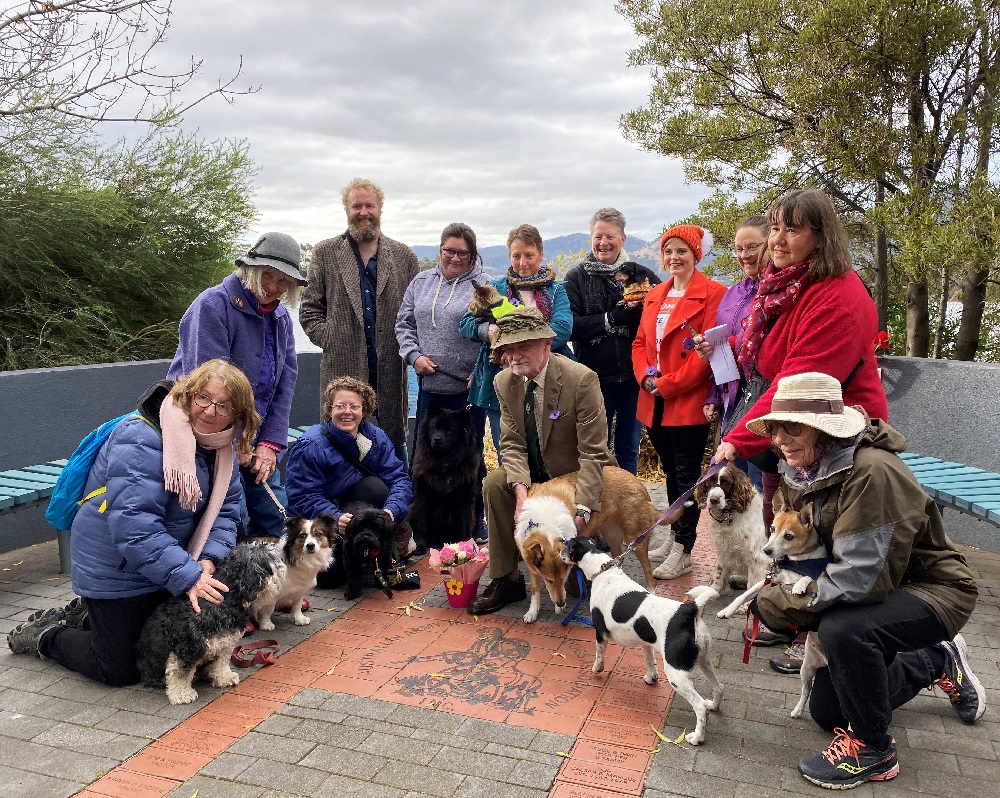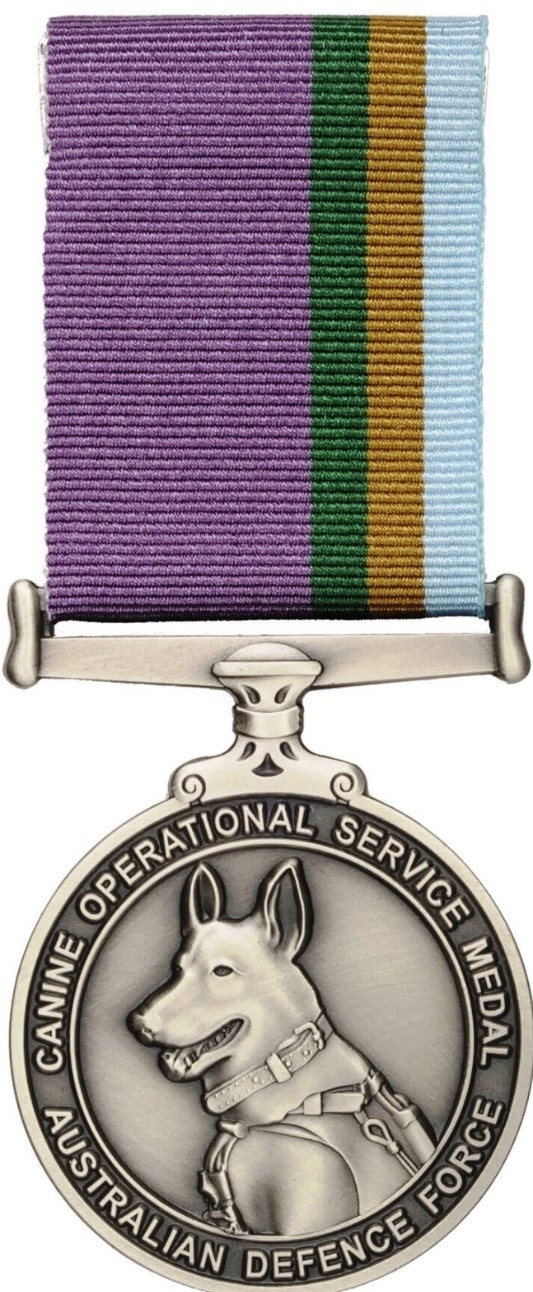Diggers and war dogs
The story of Marcus epitomises the enormous courage, unwavering loyalty and sheer hard work of our war dogs.
Since the Second World War, our dogs have served in Korea, Borneo, Vietnam, Singapore, Somalia, Bougainville, East Timor, Solomon Island, Afghanistan, and Malaysia. They currently serve with the Combat Engineer Regiments, Army Military Police, RAAF, Special Operations Engineer Regiment, Special Air Service Regiment and the 2nd Commando Regiment.
The story of Marcus epitomises the enormous courage, unwavering loyalty and sheer hard work of our war dogs.
Marcus (Tracker dog D6N06) was a black Labrador. In 1966, aged about 10 months, Marcus began his training with Private Denis Ferguson (Fergie) at the School of Infantry in Ingleburn, near Sydney.
Fergie was responsible for every facet of Marcus’s life and well-being. Bonding with the dog was the first priority — walks and play. Morning routine started with a run, grooming and obedience training, followed by a thorough clean-out of Marcus’s kennel. Marcus would be walked around the roads of Ingleburn to harden his paws and to familiarise him with traffic. Days were spent at the rifle range during live firing. Tracker training started from following fresh 5-minute-old tracks until Marcus could follow a track up to about 16 kilometres, and more than a day old.
In May 1967, Marcus and Fergie deployed to South Vietnam, joining the 2nd Battalion Royal Australian/New Zealand Regiment at Nui Dat.
Tracking teams were small, normally consisting of two dogs and two handlers, a visual tracker (trained to determine everything from the number of insurgents to what they were armed with), two cover-men plus a machine-gunner and signaller. The cover-men’s job was to bodyguard the dogs and their handlers.
The team’s main roles were to follow up enemy trails or to locate suspected enemy hideouts after a contact. They would be airlifted by helicopter into an area of operation. Once on the ground, Marcus would follow the scent (e.g. a Viet Cong footprint), taking off at speed until their location was found. He would then stop, nose extended facing the suspected enemy. At this point, Marcus and Fergie would fall back while the rest of the section behind them would search the area, often finding wounded enemy or recently occupied bunker systems that would otherwise have been missed.
Marcus’s job was one of the most dangerous jobs in the war and his team needed to have absolute confidence in his ability to ‘sense’ the enemy before actual contact was made. Peter Haran, a handler himself, wrote that Marcus was a ‘very fine tracker dog with a big heart and a very gentle nature — he would never give up’ (Peter Haran, Trackers — The Untold Story of the Australian Dogs of War, 2000).
Marcus worked hard. When Fergie completed his 13 months deployment, Marcus was handed to his second tracker, Private Alvin Petersen. Handing over was very stressful for the handlers and it must have been bewildering and stressful for the dogs too. Fergie was required to completely ignore Marcus so he would immediately bond with his new tracker.
Unlike his handlers, Marcus was in Vietnam for the entire duration of the war. He had 5 handlers (Denis Ferguson 1967–68), Alvin Petersen (1968–69), William Wright and Wayne Dixon (1969–70), Denis Ferguson and Shaun Dobson (1970–71).
By the end of the war, Marcus was exhausted. He had seen the worst of war. During a particularly hard night-time attack, trapped by a barrage of mortar fire and machine gun fire, Marcus suffered shell-shock. His eyesight was failing.
Marcus was never repatriated to Australia. He was left in Vietnam. Fergie demanded his return to Australia but it was rejected. Abandoning Marcus haunts him to this day.
Marcus was given to Lt Col Val Brown RNZIR, Commander in Chief, New Zealand Force, in Saigon. He died of natural causes shortly before the withdrawal of troops in December 1972.
Since the Vietnam War, pressure was bought to bear and our war dogs are now repatriated. Today, organisations such as the Australian Defence Force Trackers and War Dog Association (ADFTWDA) and the Australian War Animal Memorial Organisation (AWAMO) work tirelessly in promoting the work of military dogs.
ADFTWDA
ADFTWDA was founded to promote awareness of the use of Military Working Dogs (MWDs) within the ADF as well as cementing the common bond between those who serve in Combat Tracking Teams and also to provide help for those in need.
They have worked tirelessly to have medals struck to acknowledge the contribution of Military Working Dogs. In 2007, approval was granted. Since 2008, two medals are now awarded:
- The Canine Service Medal, for MWDs that have served for at least 5 years.
- The War Dog Operational Medal, for MWDs that have served on overseas operations for a period of 28 days.
Both have been posthumously awarded to all the MWDs from the Vietnam War, including Marcus.
AWAMO
AWAMO was founded in 2013 with the aim to recognise the deeds and sacrifices of all animal species, including dogs, who have given their lives and their loyalty serving alongside their human comrades in war.
Among their many achievements they have established a number of animal memorials in Australia and internationally, including the first official Australian War Animal Memorial in Pozières, France (July 2017). In 2013, they introduced the purple poppy to Australia (the animal poppy). They provide educational services for schools and dog assistance projects including KP care packages for operational dog teams in East Timor and Afghanistan.
The Canine Operational Service Medal
Introduced on 8 June 2017, the ADF is the first defence force in the world to implement recognition of this nature.
By Suzanne Curry
Suzanne Curry is a writer of natural history with a lifelong interest in dogs. She is also a member of the ADFTWDA. On 6 June this year, she conducted a Commemorative Service at the Australian Trackers and War Dogs Memorial Park in Hobart to mark National Military Working Dog Day.

Private Denis “Fergie” Ferguson with Marcus on the left and Private Peter Haran with Caesar on the right at Nui Dat, South Vietnam 1967–68.

The commemorative service Suzanne organised. At centre is Allan Wood who served in Vietnam in the 4th Royal Australian Tracker Platoon.

The ADF Canine Operational Service Medal.
